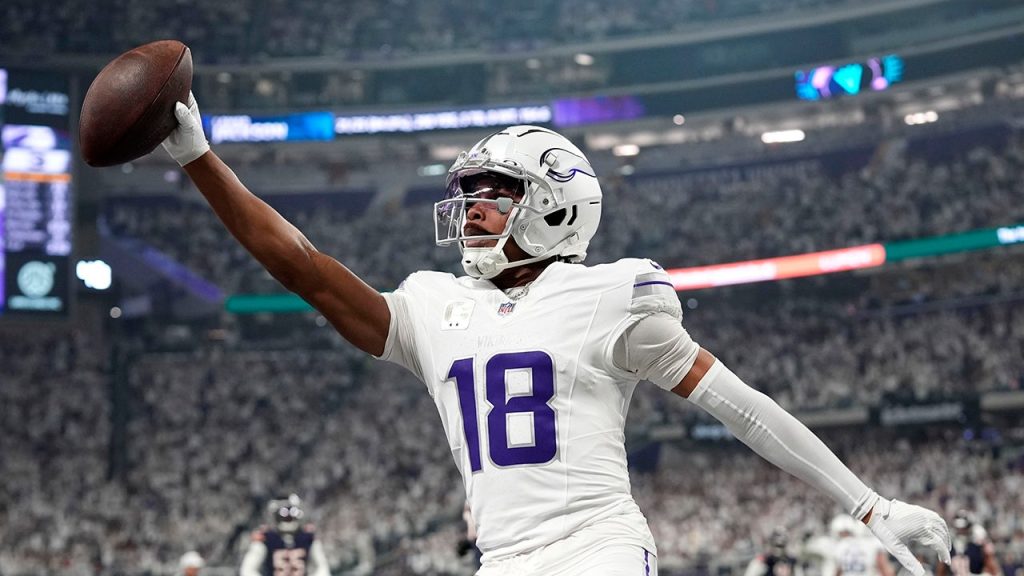The Minnesota Vikings continued their dominant streak, extending their win count to seven and tying for the division lead after a decisive 30-12 victory over the Chicago Bears on Monday night. The Vikings’ defense suffocated the Bears’ offense, led by quarterback Caleb Williams, limiting them to a single third-down conversion out of eleven attempts and sacking Williams twice. The game was played under the shadow of Randy Moss’s recent cancer diagnosis, with Vikings legends Cris Carter and Jake Reed leading tributes to the Hall of Famer. Justin Jefferson, seemingly inspired by Moss’s legacy, caught a 7-yard touchdown pass from Sam Darnold, adding to his season tally and sending a virtual get-well message to his predecessor.
Jefferson’s touchdown reception was part of a balanced Vikings offensive attack. While Jefferson finished with seven catches for 73 yards, the running game also contributed significantly. Aaron Jones powered through the Bears’ defense for 86 yards and a touchdown, while Cam Akers added another 24 yards and a touchdown. Darnold, despite facing consistent pressure, managed the game effectively, completing 24 of 40 passes for 231 yards, one touchdown, and one interception. The Vikings’ offensive diversity proved too much for the struggling Bears to handle.
The Bears, despite flashes of potential, were ultimately undone by their own mistakes and the relentless pressure from the Vikings’ defense. A critical moment in the third quarter exemplified their struggles. Running back D’Andre Swift appeared to have scored a touchdown, only to have it nullified by an illegal formation penalty due to offensive lineman Doug Kramer failing to report to the officials before the snap. This setback, compounded by a subsequent holding penalty that pushed them back from the 1-yard line to the 11, stalled their drive and forced them to settle for a field goal.
The Bears’ misfortunes further underscored the theme of the night. Their inability to capitalize on opportunities and overcome self-inflicted wounds allowed the Vikings to maintain control throughout the game. The stalled drive in the third quarter effectively extinguished any hopes of a comeback, leaving the Bears with only 12 points until a late touchdown pass from Williams to Keenan Allen. This late-game score provided a glimmer of hope for the Bears, but it was ultimately too little, too late.
Caleb Williams, facing constant pressure from the Vikings’ defense, struggled to find a rhythm, completing only 18 of 31 passes for 191 yards. Keenan Allen, his primary target, managed six catches for 82 yards and a touchdown, but the Bears’ offense as a whole lacked the consistency and explosiveness needed to compete with the Vikings. Their struggles were a stark contrast to the Vikings’ balanced and efficient performance, highlighting the disparity between the two teams.
The victory propelled the Minnesota Vikings to a 12-2 record, marking their second 12-win season in the past three years and solidifying their position as a dominant force in the NFC. Conversely, the Chicago Bears fell to 4-10, facing a challenging offseason of rebuilding and restructuring. The game served as a microcosm of the two teams’ trajectories, with the Vikings ascendant and the Bears searching for answers. The contrasting fortunes underscore the unpredictable nature of the NFL and the importance of consistent execution and minimizing errors.

